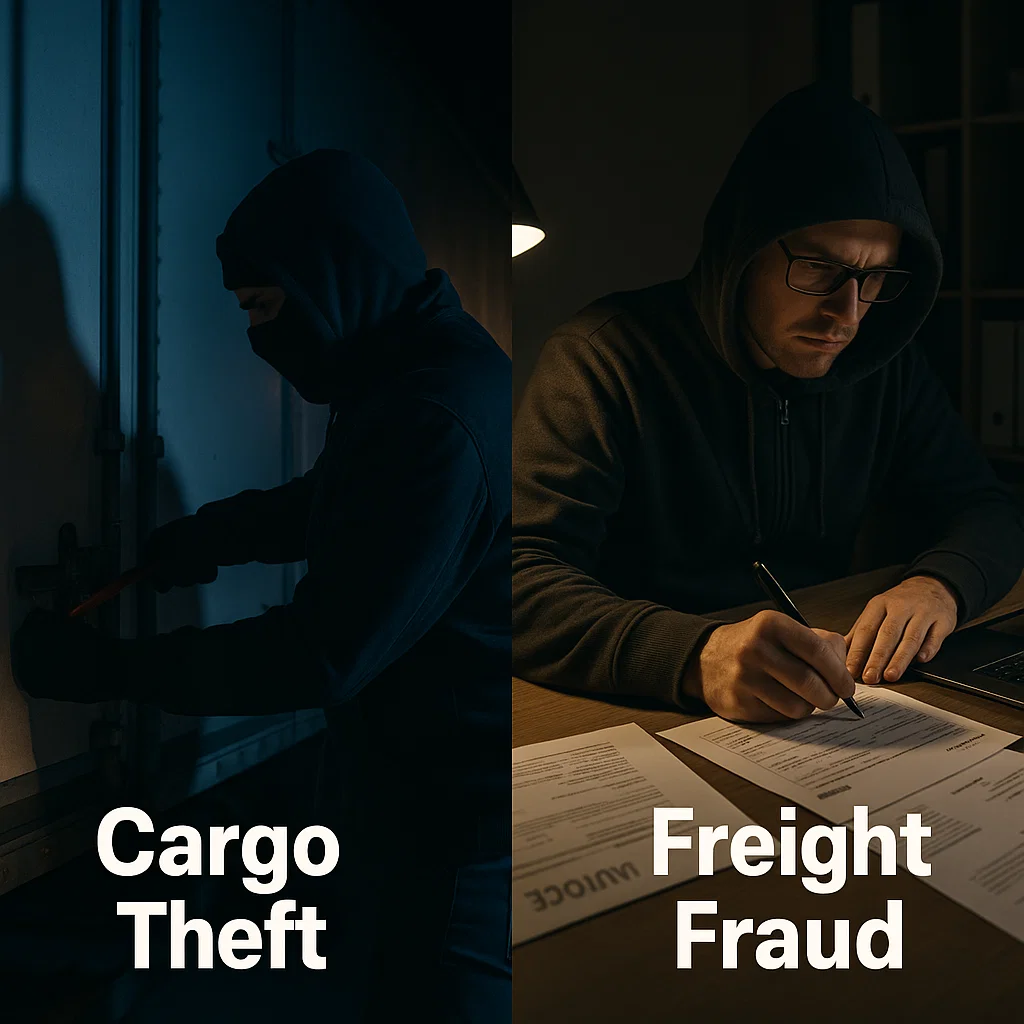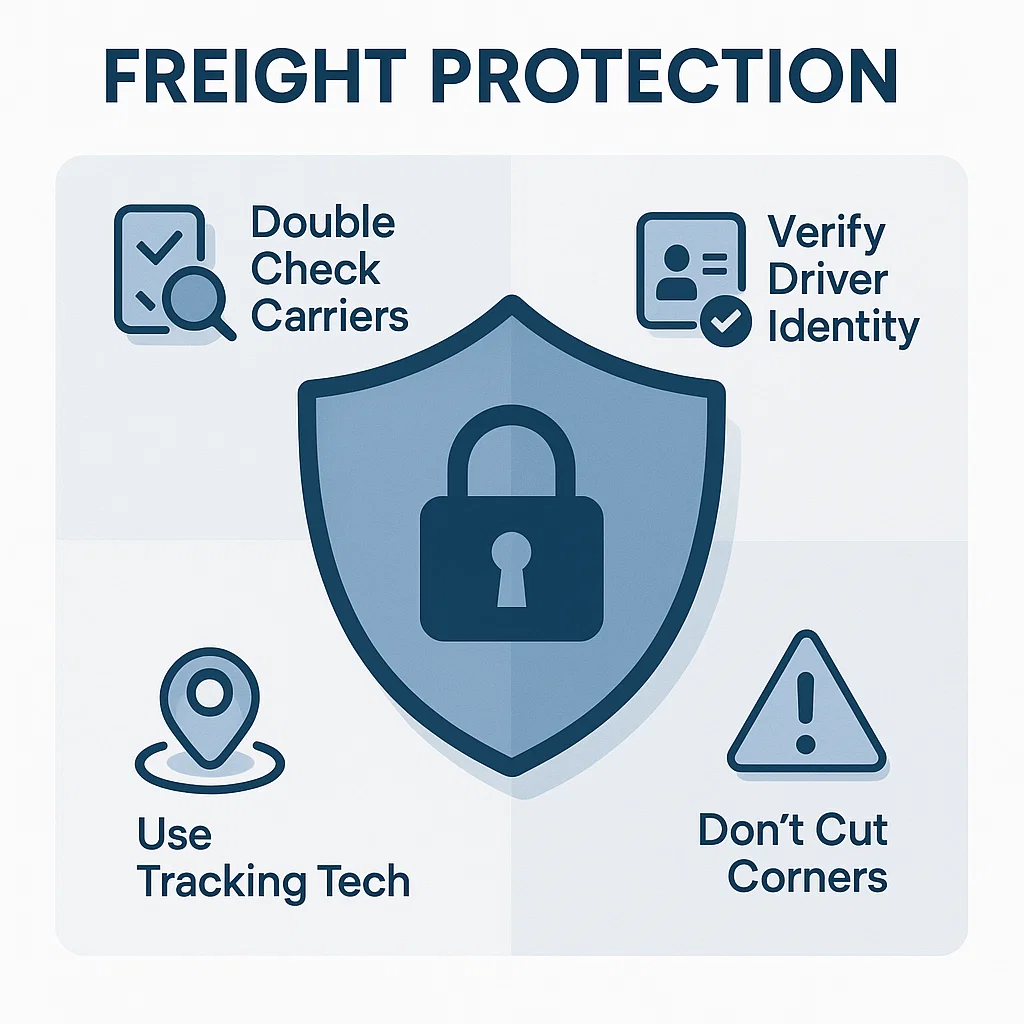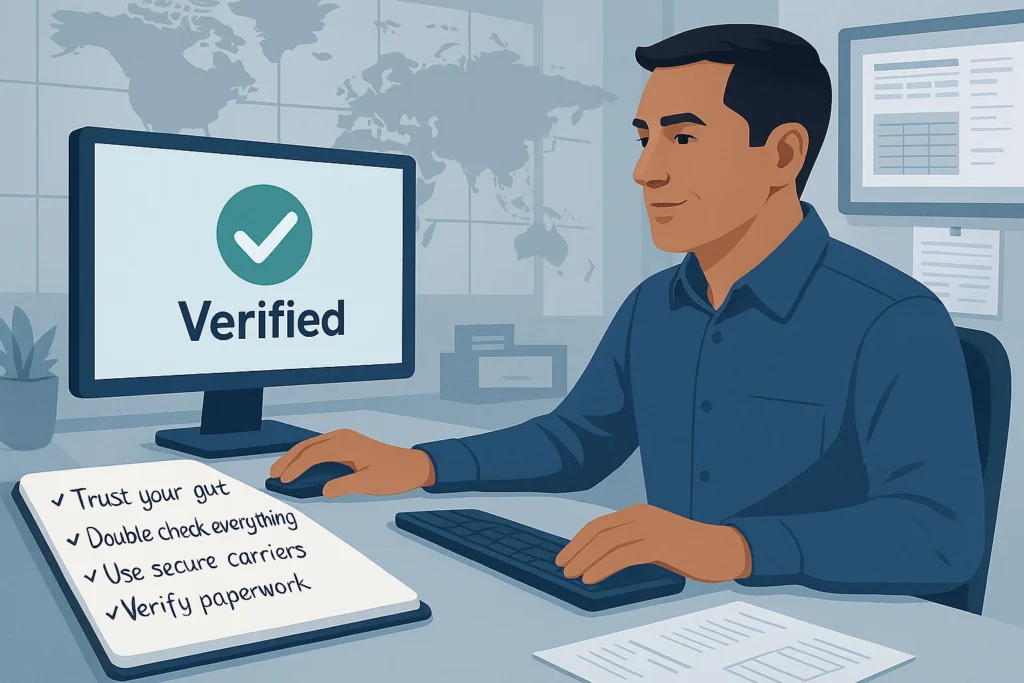
Freight Fraud: What’s Happening & How to Protect Your Business
The freight and logistics sector in the United States has been facing a serious crisis for some time. But recently, we’ve seen a sharp and dangerous rise in freight fraud. This dramatic spike in fraudulant activity is hurting businesses, and increasing costs for consumers. Whether you’re a carrier, broker or shipper the likelihood is either you or someone within your network has been affected by freight fraud, and if not then you’ve probably heard the stories at least.
Now, we know that freight fraud is nothing new, but what’s different in 2025 is the sheer scale and sophistication of today’s scams. Not only that, but these scams are not just being pulled off by a singular opportunistic person, scammers are building forces and creating criminal networks, that are leveraging technology, exploiting gaps in verification systems and capitalizing on economic uncertainty to pull off increasingly damaging attacks on the industry.
So, What Is Freight Fraud? 🤔
Unlike cargo theft, where a trailer is physically broken into to steal cargo, modern freight fraud is the product of social engineering, and it’s about tricking people into trusting the wrong party. Deception is the key for these scammers, through impersonating a legitimate business or broker, intercepting rate confirmation, imposing as a vetted carrier using stolen credentials, falsifying paperwork, manipulating communications or through exploiting a lack of due diligence. All of which result in the theft of freight, money or sensitive information.
Freight Fraud In 2025 📈
The TIA fraud report for 2025 has highlighted freight fraud as a national crisis, with cargo theft alone causing up to $35 billion in annual losses. One of the most shocking statistics that the TIA have reported is that one in four companies have lost over $200,000 to freight fraud in the last year, with most effected companies being made up of small businesses, it’s also interesting that 97% people who took part in the survey agreed that truckload freight is the most vulnerable to these sorts of fraudulant activity.
How Are These Criminals Carrying Out Such Huge Amounts Of Fraud?
Well, it’s recorded that the most common scams include; unlawful brokering, identity theft, and unresolved insurance claims. But fake brokers take the number one spot as biggest contributor the freight fraud statistics. Another thing to be mindful of is that, this fraudulant activity is not a regional threat, it’s happening nationwide, with Texas, California, South Carolina, Washington, and Virginia all seeing the highest rates of theft so far this year.
What Has Made Carriers And Shippers More Aware This Year?
Fraud reports have noticed and reported on a surge of freight fraud by 65% in six months, and yes you heard that right, that is not a typo – 65%! This inflated risk of fraud is impossible to ignore. Companies are being urged to adopt multi-layered protections, invest in verification tech, and follow fraud incident checklists to keep ahead of the rising risk.
Because even when we put the monetary impact to the side for one second, these scams are having a wider impact on our industry, they’re creating a lot of unsettlement. These scams are damaging trust within all parties involved in shipping, slowing supply chains, and leaving; drivers, carriers and shippers feeling very vulnerable.
So, What Are The Most Common Freight Fraud Schemes Being Used Today (Look Out For These 👀)
There’s only a number of ways to perform freight fraud, it’s not as if these scammers are coming up with original, creative concepts of frauding, they’re just becoming more efficient and more sneaky. Let’s take a look at the most common scams we’re seeing today:
1. Unlawful Brokering 🦹
This type of scam takes the top spot for the most common. To put it simply, it’s carried out by criminals posing as legitimate brokers, to steal loads or payments. In fact, 34% of the professionals that took part in the TIA fraud report agree that this is the scam that they face most regularly. This sort of fraud is carried out by targeting smaller businesses as they’re perceived to have less robust security and fraud prevention measures compared to larger corporations.
So, How Is This Scam Pulled Off:
The Setup: A fraudulant broker actor, accepts a load, often winning the work by undercutting legitimate broker rates and using what appears to be valid MC/DOT credentials.
The Re-brokering: The scammer re-brokers the load to a legitimate carrier at a lower rate.
The Scam: The scammer either pockets the difference or in most cases fails to pay the carrier completely that has fulfilled the delivery and the scammer vanishes altogether. Leaving the shipper out of pocket, and a legitimate carrier chasing payment.
2. Carrier Identity Theft 🦹
Now, like any identity theft, this is where scammers impersonate someone or a business. In this case, they mimic legitimate, FMCSA registered carriers. They do so by stealing their MC/DOT numbers, insurance details and company branding.
So, How Is This Scam Pulled Off:
The Setup: The scammer finds established carriers with squeaky clean records and a good reputation. They then, download as many public documents relating to this carrier as possible, including; W-9, insurance certification, rate confirmations these are all usually available in previous load board posts, so not impossible for scammers to get their grubby hands on.
The Scam: Once they have the information they need to pull it off, these scammers then set up a fake email address incredibly similar to the legitimate carriers email domain. E.g. dispatch@{carrier}.net vs the real email of dispatch@{carrier}.com. It’s crazy how similar these people can make their emails look and sound, especially when coupled with them using the target companies branding, they can be extremely convincing. They then bid on public load boards, once they get a bite, they assign a fake driver, with a cloned truck or completely vanish after taking pre-load payment.
The Consequences: In short, the most likely outcome is, the freight goes missing, and the legitimate carrier that they were impersonating rightfully so, denies all involvement. Law enforcement can get involved, although it’s fairly rare that missing freight is recovered. The worst part for the shipper, is that they’re not covered by insurance because the shipment was not actually handled by the carrier with the appropriate insurance.
3. Fake Broker Or Shipper 🦹
Ok, so this one can get confusing, we’re talking about experienced con artists, acting as a fake shipper, broker and carrier all in the same transaction! But it’s become quite an elaborate and popular scheme so we thought it’d be best to include it to bring awareness to the situation.
Let’s try and make it as unconfusing as possible in a list format😅.
So, How Is This Scam Pulled Off:
- A scammer acts as a broker to a shipper. They do this to gain the shippers credit details.
- Next, the same scammer then impersonates a shipper to a legitimate broker, using the information they just gathered from the real shipper, making it believable to the real broker.
- The scammer then goes on to pretend to be a carrier, using fake information and accept the load from the real broker.
- In the final steps of this elaborate scam, they again act as the “carrier”, invoice the real broker and collect payment.
And voila. They’ve successfully acted as all three parts in the shipping process, and no-one even realizes until the real shipper says that “they never booked a load”, which is most often at least 30-60 days after the scam. When the perpetrator is already long gone.
4. Payment Phishing 🦹
Now this scam has been going on for years, and across all different sectors.
So, How Is This Scam Pulled Off:
This is where fraudsters send illegitimate invoices, access payment systems and then reroute payments. Those with eagle eyes will spot discrepancies on the invoice, but it can be extremely difficult, especially if you’re someone dealing with invoices that normally wouldn’t. To cover yourself, check invoices through a different communication channel, i.e. call the supposed person who sent the invoice to check details with a fine tooth comb. If it’s a scam you’ll soon know as they either won’t have any recollection of what you’re talking about or together you will spot a difference in details.
Another tip we can give is always be wary of any sort of invoice that is demanding urgent or unusual payments. These scammers like to apply pressure to speed up the process, in hopes of making the receiver rush to make payment, as that’s when more mistakes are made. They ultimately get their payment and then become a ghost.
5. Load Board Scams & Ghost Loads 🦹
Fraudsters use load boards to post fake non-existent loads or contacts carriers directly with “urgent shipments”.
So, How Is This Scam Pulled Off:
They do this to either ask for upfront fees, like access or to trick them into sharing sensitive information, like bank details or MC numbers, etc. Once they have the information they want, they’ll either dispatch the carrier to a non-existing load or in some cases there might be a load, but the carrier will end up hauling goods that they don’t have a legal agreement for. Leaving the carrier with fuel costs, labor costs and no income.
6. Fraudulant Emails 🦹
Scammers aren’t only pretending to be shippers and carriers. They’re impersonating government agencies like the FMCSA, and they’re doing it well! So well in fact, that these spoof emails look incredibly real. The FMCSA has put out a notice on their website, warning people of a group of scammers using this or similar fake email address: admin@fmcsadministration.com, now at a glance, this looks legit right? well it’s in no way related to the FMCSA. Fraudsters are using this email to send phishing emails saying “immediate action required” and getting businesses to provide and upload copies of important documentation.
So, How Is This Scam Pulled Off:
Like we mentioned earlier in the ‘carrier identity theft’ section, they do this by creating fake email addresses with one digit/letter different and brand up their emails so they look legitimate.
The outcome is that these criminals are able to lure in victims to hand over their information and credentials, which they later use to pull off in depth scams.
What Are We Doing At PEI To Protect Your Shipments? 🤔
We always do our best to keep our customers shipments safe. We do the following as means of protection to not only your freight, but your details and sensitive information too:
1. Double Checking Carriers ✅
We’re double checking carriers legitimacy through different technologies that we’ve invested in before booking anything.
2. Asking For Our Customers Collaboration ✅
We’re working closely with our customers and asking them to take pictures of the truck’s name and/or MC#. We were unfortunately frauded not so long ago and we were able to track down the location of the stolen freight because of this extra step. So this one is super important.
3. Making Our Customer’s Aware Of The Driver’s Name That Is Picking Up Their Freight ✅
We advise our customers of the name of the driver that will be picking up their freight. This way, if another driver turns up, our customer can stop the shipment and alert us of the situation. Again, this step has helped us from having customers loads stolen in the past.
4. Take A Picture Of The Driver’s License ✅
We advise customers that it can come in extremely useful and tackle fraudulant activity head on if they take a picture of the driver’s driving license. This way they can check that the driver is who they say they are, check the driving license is not a fake and also with a picture, if that shipment goes missing, we know who our culprit is.
5. Don’t Cut Corners On Vetting Carriers ✅
We vet any carriers we work with by verifying their COI (certificate of insurance) with the insurance company, check safer and the FMCSA before partnering with any new carriers.
6. Pay Close Attention To Details ✅
One thing that scammers do well, is mimmic email addresses and numbers, with the slightest difference, we’re talking one letter or number different. Now, this can be super hard to spot sometimes, and this is how plenty of scammers fly under the radar. But, we try our best to catch any fake details using different approaches and tools.
7. Use Tracking Systems ✅
We use technology that alerts us if any of our shipments go “off track”. We have tight security with a certain technology that sends alerts if for example freight appears to have been sent via rail, instead of truck, etc. This extra security is like a safety blanket, we can be sure that our freight is literally on the right route.
 Stay Alert!🚨
Stay Alert!🚨
It’s a really sad and harsh reality that all shippers, carriers and brokers going forward must move freight with the assumption that fraud is always a real risk. Scams are now professionally and convincingly executed, compared to scams that took place years ago. But please don’t think you’re helpless in fighting against these criminals. Highway, a platform used to check carrier identity and see who is really hauling your freight have shut down over 400,000 fraud attempts, so far in 2025 alone. So there is hope that with the right steps, security and and partners we can minimize and beat fraud in the industry. Here’s some key tips on how to stay alert;
- Stay incredibly vigilant (double check EVERYTHING)
- Work with carriers and brokers that you know and trust
- Invest in enhanced cyber-security
- Partner with carriers and brokers that only work with extreme caution
- Build in strong checks at every step of the shipping process
- Utilize available softwares and tools
Always trust your gut, even if it’s just a “feeling” that something is off don’t be afraid to walk away from an uncomfortable situation. We’re always on hand to discuss any freight needs you might have, and like we mentioned earlier we do everything in our power to ensure our loads and your cargo are as safe as they can be against any kind of threat. So, if you want to partner with a reliable, trustworthy and experienced transportation provider then please reach out. We’d love to hear from you, let’s keep moving together and beat the scammers! 😊
Need help with any of your specialized domestic shipments?
Today can be the day you stop struggling with your logistics problems.
At PEI we’re experts in dealing with specialized freight and can handle yours with any custom requirements.
